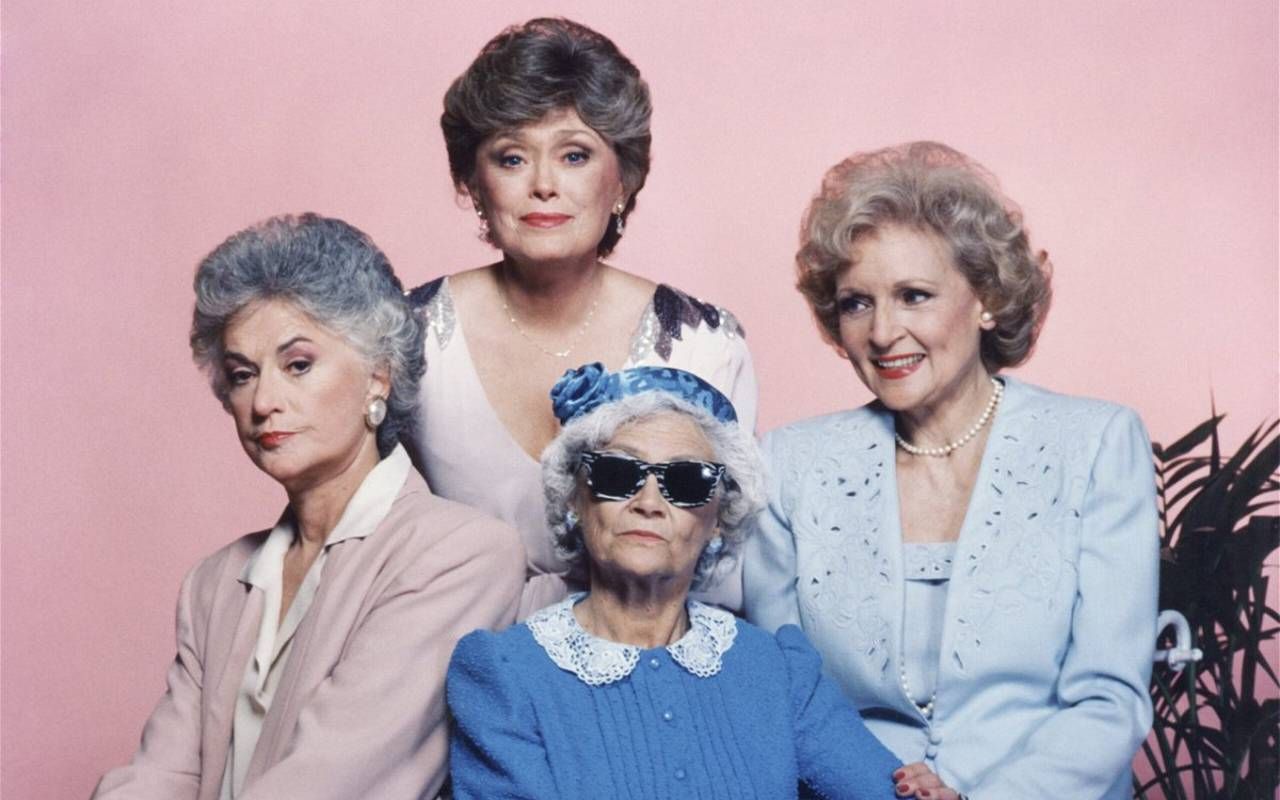'The Golden Girls' Cracked the Code on Aging Well: Limit Social Isolation and Loneliness
'The Golden Girls' showed how essential social connections are to physical, mental and social health
Back in 1985, when Susan Harris, an American television writer and producer, created the Emmy Award-winning sitcom "The Golden Girls," not only did she write a script for success but also offered viewers a glimpse into the ingredients necessary for longevity.

All four characters individually and collectively espoused what medical experts agree today can help us remain healthy through aging: avoiding loneliness and social isolation by connecting with others.
For seven seasons, the show invited us into the Miami, Florida, home of three "middle-aged" women and one octogenarian, who chose to live as roommates and quickly became best friends and family to one another.
"Every person has their own desired level and actual level of social connection. So, when your desired level doesn't equal your reality, you feel lonely."
Each week, these four women: Dorothy (Bea Arthur) and her mother, Sophia (Estelle Getty); Blanche (Rue McLanahan) and Rose (Betty White) navigated issues around getting older, such as divorce, widowhood, finances, romance, sexuality and other topics with humor and honesty, then reflected on life's lessons while enjoying their signature cheesecake dessert.
In May 2023, the U.S. Surgeon General, Dr. Vivek Murthy, again declared loneliness and social isolation a public health crisis in the United States. According to the Surgeon General, experiencing loneliness and social isolation increases the risk for individuals to develop both mental health and physical challenges, which can impact mortality. The World Health Organization states loneliness can be as dangerous as smoking 15 cigarettes per day.
Social Isolation and Loneliness: Differences and Similarities
"I liken loneliness and social isolation as an equation," said Caitlin Coyle, PhD, director of the Center for Social & Demographic Research on Aging at the University of Massachusetts and co-director of the Massachusetts Task Force to End Loneliness & Build Community. "This means every person has their own desired level and actual level of social connection. So, when your desired level doesn't equal your reality, you feel lonely."
Further defined, loneliness is subjective; you can have a wide variety of friends and still feel alone and be distressed about that, whereas social isolation is objective, meaning there is a limited number or absence of social ties or connections. It's essential to understand and be mindful that social isolation can lead to loneliness, which is why, Coyle suggested, the two often go hand-in-hand.
Social isolation isn't necessarily something that happens overnight. As we age, we've likely experienced life changes. Whether it's losing a spouse or partner through death or divorce, becoming ill yourself, leaving your job due to corporate downsizing or planned retirement, or willingly moving to a new community — any transition can result in social isolation if left unchecked.
Who Is Impacted and Who Is at Risk
According to the latest statistics, 33% of adults over 45 feel lonely, 25% over 65 note being socially isolated, and 1 in 3 lack regular companionship.
"We know that when people feel bad, a stress response activates in the body."
Unfortunately, anyone and everyone is at risk. However, older adults who live alone, are in a lower socio-economic bracket, or suffer from mobility, hearing or other impairments are at an even greater threat for poorer physical, cognitive and emotional health.
As it relates to both mental and physical health, Coyle described loneliness as a socio-emotional response that is often distressing. "We know that when people feel bad, a stress response activates in the body," she said. "This then begins a cycle of reactions and consequences, including the co-occurrence of depression and other mental health conditions, while the stress hormones released into the body have negative physical impacts as well."
The Surgeon General's report highlighted startling health statistics when there is a low human connection level, including average increased risks of 30% for heart disease and stroke, 50% developing dementia in older adults, and worse yet, premature death by more than 60%.
So, how do we mitigate and protect ourselves from the ill effects of being lonely or socially isolated when as many as 15 million older adults (65+) live alone, some people don't (or won't) identify as "lonely" even if they are due to negative bias and virtual events continue in the wake of COVID?
Sexual innuendos aside, The Golden Girls understood the benefits of sex regardless of age, with all four women craving the connection that comes from having a physical relationship.
The Wisdom of the Golden Girls' Lifestyles
'Roll in the Hay' (so to speak)
Sexual innuendos aside, The Golden Girls understood the benefits of sex regardless of age, with all four women craving the connection that comes from having a physical relationship. Between Sophia modeling her continued desire for intimacy well into her 80s and Dorothy finding love and having such great sex ("We named it," she exclaimed), research finally caught up.
In 2019, a longitudinal study showed that the quantity and quality of partnered sex are good for older adults' mental health. In addition to reducing stress and improving mood, study after study shows other health benefits, such as improving heart health and boosting immunity, to name only two.
Volunteer
Whether serving food at a shelter during the holidays, delivering Meals on Wheels to those in need, befriending a Vietnam veteran, or acting as a Candy Striper at a local hospital, "The Golden Girls" enjoyed acts of service and giving back to their communities. Volunteering is a great way to stay connected with others while benefiting your health. Researchers analyzed data from the Health and Retirement Study in 2019, with evidence pointing to lower mortality rates, higher physical functioning and reduced depression in adults 50 and over who volunteer more than 100 hours per year.
A quick Google search combined with your passions will list charitable organizations to donate your time in seconds. Contact your local Area Agency on Aging office if you require support.
Live in a Multigenerational Household
According to a 2021 Generations United report, the number of people in multigenerational households has risen, with as many as 26% of Americans living with those across age sectors. While families or friends may have started living together during the COVID-19 pandemic, many are staying together for extra financial, health care and emotional support.
As frustrating as living with family may be for some — like when Dorothy threatens Sophia she'll send her back to "Shady Pines" (the nursing home her mother nearly burned down) – there are compelling reasons for doing so. The Generations United study participants responded with more than 70% favorability in areas such as enhanced relationships, improved finances, and, most notably, positive impacts on personal mental and/or physical health.
There were many additional ways the TV family defied the aging process. Whether stepping out of their comfort zone, learning something new, such as painting, sculpting or dancing, reading, and continuing to work part-time, they seemed to find the most impactful ways to age well instinctively while maintaining the bonds that bind.
Limit Social Isolation and Loneliness to Protect Your Health
Of course, the above ideas may not be appealing, possible or suitable for you. Karen Midyet, a clinical psychologist and owner of Coaching Aging Adults in Fort Collins, Colorado, educates clients on how to find fulfillment and connection when designing the last half or third of their lives.
If you are more introverted, "It may not be easy, but it is just as crucial for your health to engage socially with others." In other words, fake it until you make it.
"Many of the people I coach never thought about how they would spend their days after retirement," Midyet said. "Instead, they were busy working and didn't spend much time and energy on outside relationships or activities."
When reflecting on where to start, Midyet recommends asking yourself two questions, "Who am I now?" and "Who do I want to be?" Midyet helps her clients move past 'shoulds" and focuses on their individuality, where their energy comes from, and what excites them.
Turning to one's community is often the first step to finding a source of enjoyment. Whether attending religious services, chatting with your neighbors, playing pickleball or joining Meetup groups, the key Midyet offered is repetition.
"Once you continue to see the same people repeatedly, you begin to build a rapport. But it takes time and effort," she said. If you are more introverted, Midyet noted, "It may not be easy, but it is just as crucial for your health to engage socially with others." In other words, fake it until you make it.
"The Golden Girls" theme song ended with "Thank you for being a friend." While the "girls" had each other, having one person you can trust, rely on, and confide in can improve your physical, mental and social health outcomes.
Coyle stressed that it is not the quantity of relationships one has but the quality that offers protection against loneliness and social isolation. And that even the most minor action can provide positive health benefits. For example, compliment a stranger at the grocery line, chat about the weather with the postal worker or say "hello" to someone walking by you.
"These gestures serve as reminders that you are in community with others and that someone sees you," Coyle said. "It doesn't have to be a deep, intimate relationship to reap the rewards."


